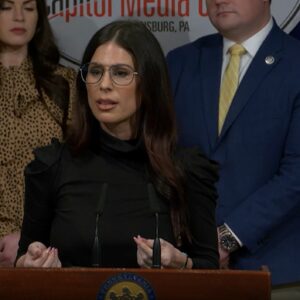Ashley Spence burst into tears when she heard a judge sentence the man who raped and nearly killed her to almost 138 years in prison.
“As I stood in the back of the courtroom and heard these words, my head fell into my hands, and I began to cry,” said Spence. “I cried for the pain. I cried for the justice that I finally felt after 13 long years. I cried for the protection I now felt, not just for myself but for my children. But mostly, I cried because I knew this man would never be able to harm another person again.”
In 2003, when Spence was 19 and a sophomore at Arizona State University, she moved into an apartment and went to bed “thinking that I was safe.”
But during the night, “while I was asleep, an intruder came into my apartment, suffocated my face with a pillow and began to tear off my clothes from the waist down…I thought it was a nightmare.”
Her assailant beat her and raped her while keeping a pillow over her face.

(From left) Sen. Frank Farry, Rep. K.C. Tomlinson, Sheriff Fred Harran, Ashley Spence, and Rep. Joe Hogan.
“The entire time, I could not see the face of the monster that was committing these horrific crimes against me,” Spence said. “I’m so fortunate I survived, but he got away, and I never saw his face.”
Spence spoke at a press conference called by Bucks County state Reps. Joe Hogan, K.C. Tomlinson, and Sen. Frank Farry, along with Bucks County Sheriff Fred Harran, spoke about a new bill that would require DNA samples to be taken from people arrested for felonies and some misdemeanors.
Seven years after he raped her, Spence’s assailant was arrested for a different crime in California and linked to her attack through DNA. She founded the DNA Justice Project to push for states to change their laws so that DNA is taken for felony arrests, not just when a criminal is convicted. So far, 19 states do. Hogan, Tomlinson, Farry, and Harran want Pennsylvania to be next.
“This is something that we believe is important to the state of Pennsylvania,” said Hogan (R-Feasterville-Trevose). “Current law in Pennsylvania is that DNA is collected post-conviction for some crimes. The law notably excludes homicide (which is taken on arrest).”
The proposed law would require DNA collection for felony arrest. If a person is exonerated, their DNA will be taken out of the system. There is great potential for solving cold cases, like the Fairmount Park rapist, Hogan said. Just last year, DNA linked a suspect to several 2003 rapes and a murder.
“The changes we are proposing mean that when an individual is booked for one of these crimes, their DNA is taken at the same time as their fingerprint. These two procedures are fundamentally the same. But as we know, DNA is vastly more accurate,” said Hogan.
Tomlinson (R-Bensalem) said, “There is no denying we’ve all been seeing a steady rise in crime, not only in this state but across this country. Unfortunately, crime has become a real concern in my district. Over 40 percent of the individuals arrested and committing crime in my hometown do not even reside there.”
The DNA tests would also help prove a person was innocent, she added.
Farry (R-Bucks) said he would introduce a companion bill in the Senate.
“What we’ve seen is DNA is an incredible tool,” said Harran. “We’ve started doing some outside-the-box approaches using DNA, and we saw some significant crime reduction. But crime has been going up recently.”
“What I’ve found is in Pennsylvania, there’s a loophole,” said Harran, formerly Bensalem’s director of public safety. “We are one of 19 states that do not take DNA at the time of arrest, which is a mistake. DNA in Pennsylvania it’s taken once you’re convicted of a felony…That DNA that’s taken is way too late. We need to take DNA at the time of arrest…The Supreme Court has already talked about this in 2013 in a case (from) Maryland. DNA is just another tool. It’s probably one of the best tools I’ve seen in the last 38 years. We have some great crime reduction numbers to prove that.”
“In Lower Bucks County, 16 times we’ve used DNA to exonerate people,” said Harran. “This prevents crime. You’re getting criminals off the street immediately…And tomorrow, they will be one less victim out there.”
Spence said, “DNA is science. DNA is accurate. DNA is true.”

